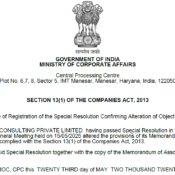Related Party Transactions: A Guide for Private Limited Companies
As a Corporate Lawyer, I can explain related party transactions under the Companies Act, 2013.
Related party transactions are transactions that occur between two parties that have a pre-existing relationship with each other. These transactions can include sales, purchases, or other financial dealings, and they can occur between individuals, companies, or other entities.
Section 188 of the Companies Act, 2013 lays down the requirements for related party transactions. It states that such transactions must be approved by the board of directors and also require prior approval of shareholders by passing a special resolution. The Act also requires companies to disclose details of all related party transactions in their annual financial statements.
Example of the key managerial personnel (KMPs) and their relatives as per the Companies Act, 2013.
Suppose a private limited company ABC has the following KMPs:
- Mr. X – Managing Director
- Ms. Y – Chief Financial Officer
- Mr. Z – Company Secretary
Under the Companies Act, 2013, KMPs are defined as:
- The Chief Executive Officer (CEO) or Managing Director (MD) or Manager
- The Company Secretary
- The Chief Financial Officer (CFO)
- Any person who is appointed as a KMP by the Board of Directors
If any of the above KMPs, or their relatives, hold substantial ownership or control in another company, then transactions between that company and ABC would be considered related party transactions under the Act.
As per the Companies Act, 2013, relatives of a KMP include:
- Spouse
- Father or mother (including step-mother and father)
- Son or son’s wife
- Daughter or daughter’s husband
- Brother or sister (including step-brother and step-sister)
For example, if Mr. X’s wife holds 20% or more of the equity share capital in another company, then any transactions between that company and ABC would be considered related party transactions under the Act.
Similarly, if a company in which Ms. Y’s brother is a director holds 20% or more of the equity share capital in another company, then transactions between that company and ABC would also be considered related party transactions.
Table of Contents
ToggleDirector’s salary and perquisites
companies can implement the following control mechanisms:
-
- Appointment of Remuneration Committee: Companies can appoint a remuneration committee consisting of independent directors and other members to recommend and approve the remuneration and perquisites of directors. The committee can consider factors such as the company’s financial performance, industry benchmarks, and the director’s experience and contribution to the company.
-
- Disclosure and Approval: The directors can disclose their salary and perquisites in the annual report of the company, along with the details of any related party transactions. The Board of Directors can review and approve the same based on the recommendations of the remuneration committee.
-
- Compliance with Laws: The company should ensure that the director’s salary and perquisites comply with the applicable laws and regulations, including the Companies Act, 2013, and the Income Tax Act, 1961.
-
- Independent Audit: Companies can conduct an independent audit of the director’s salary and perquisites to ensure that they are fair and reasonable, and that there is no abuse of power or related party transactions.
By implementing these control mechanisms, companies can ensure that the director’s salary and perquisites are determined in a transparent and fair manner, and that there is no abuse of power or related party transactions.
Under the Companies Act, 2013, related party transactions are regulated and monitored to ensure fairness and transparency in corporate dealings. The Act defines related parties to include directors, key managerial personnel, and their relatives, as well as companies in which they hold substantial ownership or control.
companies in which they hold substantial ownership or control” as per the Companies Act, 2013 and its applicability to Trust holding or proprietorship business.
Under the Companies Act, 2013, a person is considered to hold substantial ownership or control if they hold 20% or more of the equity share capital of the company, or have the right to exercise significant influence or control over the company. The Act also includes entities in which such persons are directors or key managerial personnel, or have the ability to control the management or policies of the entity.
This definition of substantial ownership or control applies to companies and limited liability partnerships (LLPs) registered under the Act, and the provisions regarding related party transactions under Section 188 apply to such entities.
However, it is important to note that Trust holding or proprietorship business are not registered as companies or LLPs under the Companies Act, 2013. Therefore, the provisions regarding related party transactions do not directly apply to them.
That being said, if the trust or proprietorship business is a related party to a company or LLP as defined under the Act (for example, if the directors or key managerial personnel of the company are also involved in the trust or proprietorship business), then any transactions between the two entities must comply with the related party transaction provisions under Section 188 of the Act.
In such cases, the company or LLP must disclose details of the related party transactions in its annual financial statement as per the Act’s requirements. Additionally, any loans or financial dealings between the company or LLP and the trust or proprietorship business must be conducted at arm’s length and in compliance with the provisions of the Act.
Identifying substantial control can be done by looking at the ownership or management structure of a company. Here are some factors to consider when determining substantial control:
-
- Ownership of Shares: The percentage of shares owned by an individual or entity can indicate substantial control. Generally, if an individual or entity owns more than 20% of the total shares of a company, they are considered to have substantial control.
-
- Board of Directors: If an individual or entity has the power to appoint or remove the majority of the board of directors, they may have substantial control over the company.
- Voting Rights: The number of votes that an individual or entity can cast at a general meeting can indicate substantial control. For example, if an individual or entity has more than 50% of the voting rights, they have substantial control over the company.
-
- Management: If an individual or entity has the power to make strategic or operational decisions that significantly affect the company’s business, they may have substantial control.
Here is an example of how substantial control can be identified:
Mr. A owns 35% of the shares of Company XYZ, and also has the power to appoint or remove the majority of the board of directors. Additionally, Mr. A has the power to make strategic and operational decisions that significantly affect the company’s business. In this case, Mr. A has substantial control over Company XYZ.
Quantifying substantial control depends on the specific circumstances of each case. Generally, substantial control is quantified by looking at the percentage of shares owned, the number of votes that an individual or entity can cast, and the power to make decisions that affect the company’s business. However, the exact percentage or number can vary depending on the specific situation.
It is important to note that the determination of substantial control is not always straightforward and may require legal expertise to interpret and apply the relevant laws and regulations.
example to illustrate the disclosure of related party transactions in the annual financial statement of a private limited company.
Suppose a private limited company ABC has three directors, A, B, and C, who are also the shareholders of the company. During the financial year 2022-23, each director has given a loan of Rs. 10 lakhs to the company to meet its working capital requirements. As per the provisions of the Companies Act, 2013, these transactions are considered related party transactions.
To comply with the Act, ABC should disclose the details of these transactions in its annual financial statement for the year ended 31st March 2023. The disclosure should include the following information:
- Name of the related party (in this case, the three directors A, B, and C)
- Nature of the transaction (loan given to the company)
- Amount of the transaction (Rs. 10 lakhs by each director)
- Terms and conditions of the transaction (interest rate, repayment schedule, etc.)
- Justification for the transaction and how it benefits the company
- Whether the transaction was conducted at arm’s length or not
some general examples of related party transactions and the forms that can be used for approval. I can also explain how the arm’s length price can be calculated in these situations.
Examples of related party transactions:
- Purchase or sale of goods or services between the company and a related party
- Loans or advances given or received from related parties
- Leasing of assets or property to or from related parties
- Guarantees given or received from related parties
- Payment of salary or remuneration to directors, key managerial personnel, or their relatives
Forms for approval of related party transactions:
- Pre-disclosure form: This form should be used by the director or key managerial personnel to disclose their interest in the transaction before it is considered by the Board or Audit Committee.
- Approval form: This form should be used by the Board or Audit Committee to approve the related party transaction.
AOC-2 Form: This form should be filed with the Registrar of Companies (RoC) within 30 days of the Board meeting in which the related party transaction was approved.
Additionally, the Act mandates that related party transactions should be conducted at arm’s length, meaning that the terms and conditions of the transaction should be similar to those that would be negotiated between unrelated parties in a similar situation. Any deviation from arm’s length transactions must be justified and disclosed to the shareholders.
The Act imposes penalties and fines for non-compliance with related party transaction provisions. In addition, if any related party transactions are found to be fraudulent or collusive, the persons involved can be held liable for civil and criminal action.
Below Guidelines can be communicated to all stakeholders of your private limited company to ensure that they adhere to the requirements and make the necessary disclosures in a timely manner.
-
- Identify related parties: The first step is to identify all related parties as per the definition under the Act. This includes individuals or companies in which directors or key managerial personnel hold substantial ownership or control, or entities in which they are directors or key managerial personnel.
-
- Maintain a register of related parties: Maintain a register of all related parties along with details such as their names, relationships, and nature of transactions.
- Prior approval: Ensure that all related party transactions are approved by the Board of Directors or the Audit Committee before they are entered into. This includes transactions such as sale, purchase or lease of property, assets or services, and lending or borrowing of money.
-
- Disclosure in financial statements: Ensure that all related party transactions are disclosed in the financial statements of the company. The disclosures must include the nature and value of the transactions, the relationship between the parties, and any other relevant information.
-
- Disclose in Board meeting: Require all related parties to disclose their interest in the related party transactions in Board meetings. This includes disclosing the nature and extent of their interest in the transaction and any other relevant information.
Annual disclosure by related party: Require all related parties to disclose their interest in the related party transactions annually in writing. This should be done at the beginning of each financial year or before the meeting of the Board of Directors where the related party transaction is being considered.
By following these guidelines, your private limited company can ensure compliance with the related party transaction provisions under Section 188 of the Companies Act, 2013.
here are a few examples of cases related to Section 188 of the Companies Act, 2013, in the context of private limited companies:
-
- In the case of Suman Motels Pvt. Ltd. vs. State Of West Bengal And Ors. (2021), the Calcutta High Court held that the requirement of obtaining prior approval of the Board of Directors for related party transactions under Section 188 of the Companies Act, 2013, is mandatory and cannot be dispensed with. The Court also held that the penalty for non-compliance can be imposed on the company and its directors.
-
- In the case of Sudhir Gopi vs. IndusInd Bank Ltd. and Ors. (2019), the Bombay High Court held that a private limited company is also required to comply with the related party transaction provisions of the Companies Act, 2013. The Court held that the approval of the Audit Committee and the Board of Directors is necessary for any related party transaction.
-
- In the case of Kusum Healthcare Pvt. Ltd. vs. M/S. Aditi Healthcare Pvt. Ltd. (2020), the Delhi High Court held that a private limited company cannot enter into a related party transaction without complying with the requirements of Section 188 of the Companies Act, 2013. The Court held that the company was required to obtain prior approval of the Board of Directors and that failure to do so renders the transaction void.
As a Corporate Lawyer, I advise businesses to carefully comply with the requirements and regulations governing related party transactions to avoid any legal or financial repercussions. It is essential to ensure transparency and fairness in all dealings to protect the interests of the company and its shareholders.
Important Links –
Like Us On Facebook

Our Client's Review
EXCELLENT Based on 42 reviews
Based on 42 reviews

 Nitesh P2023-07-31
Nitesh P2023-07-31Trustindex verifies that the original source of the review is Google.
Best place to file ur GST n IT returns .. They respond quickly, communicate well and get ur work done as per ur needs in a very short time ..
 Raghavendran V2023-07-27
Raghavendran V2023-07-27Trustindex verifies that the original source of the review is Google.
Best place for Income tax filing
 Shruti Pb2023-07-17
Shruti Pb2023-07-17Trustindex verifies that the original source of the review is Google.
Of all the CA, CS teams I have interacted with, they are the most prompt and organized. I have taken their services for almost 3 years now for various things like income tax queries, income tax filing, networth certificates, and compliance certificates. They always display a clear understanding of the law and are also able to explain it to you in layman terms. Overall a very resourceful and courteous team. Thank you for the support!
 Suvadhana B2023-03-13
Suvadhana B2023-03-13Trustindex verifies that the original source of the review is Google.
Best company secretary I bangalore ever seen such quick quality service
 Heenarustam Sayal2023-03-12
Heenarustam Sayal2023-03-12Trustindex verifies that the original source of the review is Google.
Prakasha & Co has been a lifesaver for me when it comes to my tax dispute and filings with IT office. They are always very responsive and helpful whenever I have any questions or issues, I recently had an issue with my sister business GST filings, and they were able to quickly identify the issue and help me resolve it. They really go above and beyond to make sure their clients are taken care of.
 moh Samn2023-02-17
moh Samn2023-02-17Trustindex verifies that the original source of the review is Google.
''The team at Prakasha& Co made sure my company was compliant with all the legal requirements. Their attention to detail and timely response was truly remarkable."
 Rizwan RS2023-02-17
Rizwan RS2023-02-17Trustindex verifies that the original source of the review is Google.
"I was impressed with the level of customer service provided by Prakasha& Co. They were always available to answer my questions and provide guidance throughout the company registration process."
Important Links
- Top 10 GST Registration Consultants in Bangalore
- Top 10 Best Income Tax Lawyers in Bangalore
- Top 10 Trademark Registration Consultants in Bangalore
- GST Registration in Bangalore
- Private Limited Company Registration in Bangalore
- Partnership Firm Registration in Bangalore
- Proprietorship Registration in Bangalore
- Trademark Registration in Bangalore
- Audit Frim in Bangalore
- CA Firm in Bangalore
- Accounting Services in Bangalore
- GST Lawyers in Bangalore
- Payroll Services Provider in Bangalore
- Payroll Consultant in Bangalore
- Income Tax Lawyer in Bangalore
All Categories
- Audit
- Blogs
- Bookkeeping Services
- Company Registration
- Company secretary Legal & Chartered Accountant
- Digital Signature Certificate (DSC) Services
- FSSAI Registration and Consultation
- GST
- Income tax
- Partnership Firm Registration
- Payroll Services
- Risk Management Services
- Startup Registration Process
- Trademark Registration
- Uncategorized







